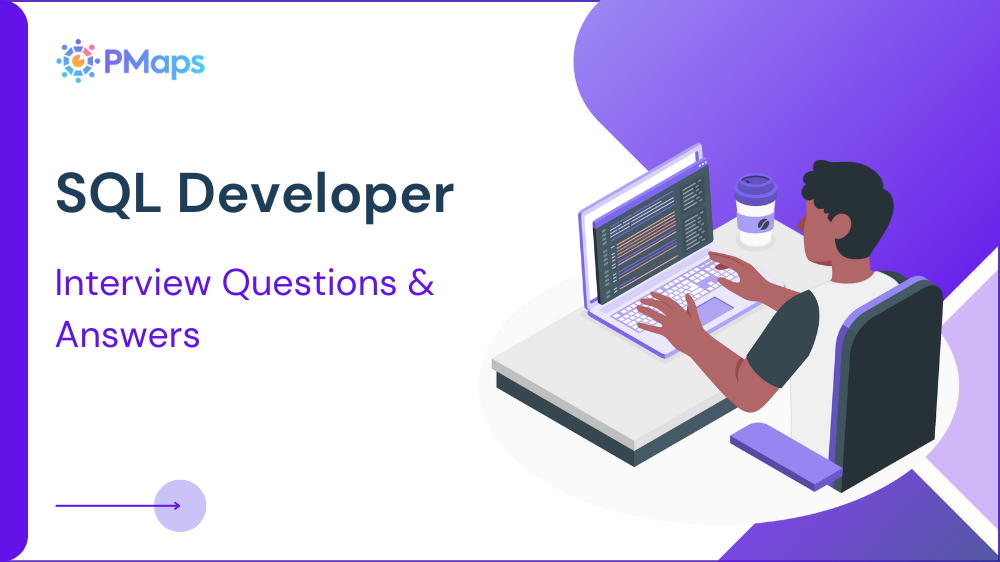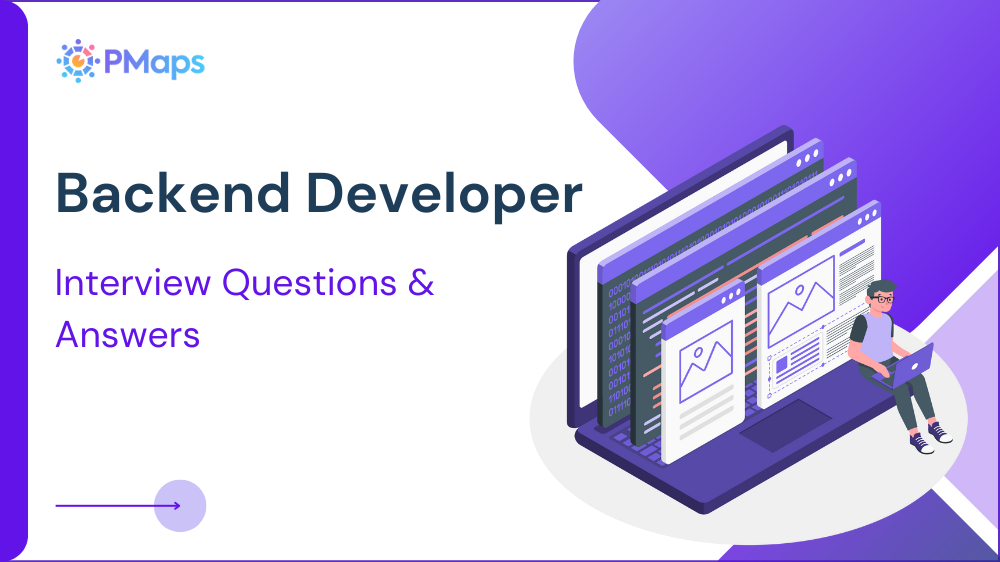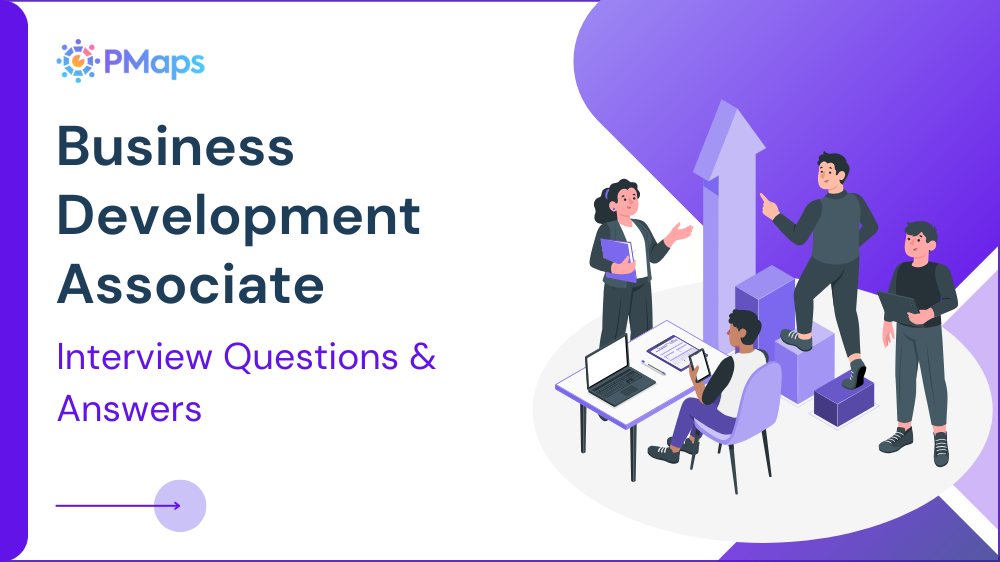
SQL developer questions are designed to test both technical expertise and problem-solving skills in database environments. While SQL proficiency is essential, employers must also evaluate a candidate’s ability to optimize queries, design efficient data models, and handle real-world challenges in performance tuning and data security.
Asked good queries? Now run the SQL Developer Test to see them in action.

A structured interview ensures you uncover not just coding knowledge, but also how candidates approach scalability and collaboration in enterprise systems.This guide compiles the most relevant SQL developer questions and answers. It includes general, behavioral, situational, and technical interview scenarios, each with insights on what they assess, what hiring managers should listen for, and sample ideal responses. Whether you are hiring for Oracle SQL or SQL Server roles, this framework helps identify developers who can deliver reliable, high-performance database solutions.
Technical questions done? Make sure the role aligns—view the SQL Developer Job Description.
General Interview Questions for SQL Developers
General sql developer questions help interviewers assess a candidate’s foundational knowledge of databases, query handling, and real-world application of SQL concepts. These early questions reveal both technical fluency and clarity in communication.
1. Can you explain the difference between SQL?
- What it assesses:
Understanding of database programming versus query language. - What to listen for:
Ability to distinguish SQL as a query language and PL/SQL as a procedural extension. - Sample ideal answer:
“SQL is used to query and manipulate data, while PL/SQL extends SQL with procedural programming features like loops, conditions, and exception handling. SQL is declarative, whereas PL/SQL allows building complex scripts and stored procedures.”
2. What are the most commonly used SQL commands?
- What it assesses:
Core knowledge of SQL operations. - What to listen for:
Mention of DML, DDL, DCL, and TCL commands. - Sample ideal answer:
“The most common commands are SELECT, INSERT, UPDATE, and DELETE for DML. CREATE and ALTER are key DDL commands, while COMMIT and ROLLBACK handle transactions. GRANT and REVOKE fall under DCL for permissions.”
3. How do you optimize a slow-running SQL query?
- What it assesses:
Performance tuning and analytical skills. - What to listen for:
Index usage, query restructuring, execution plans, and database statistics. - Sample ideal answer:
“I analyze the execution plan to identify bottlenecks, ensure proper indexing, and avoid unnecessary joins or subqueries. Sometimes rewriting a query using EXISTS instead of IN improves performance. Regularly updating statistics also helps the optimizer.”
4. Can you explain the difference between primary key and unique key?
- What it assesses:
Knowledge of constraints and database integrity. - What to listen for:
Clear explanation of uniqueness and null values. - Sample ideal answer:
“A primary key uniquely identifies each record and cannot contain NULL values. A unique key also enforces uniqueness but allows one NULL value. A table can only have one primary key but multiple unique keys.”
5. What is normalization and why is it important?
- What it assesses:
Data structuring and design fundamentals. - What to listen for:
Understanding of normal forms, redundancy reduction, and performance trade-offs. - Sample ideal answer:
“Normalization organizes data into tables to minimize redundancy and improve data integrity. For example, separating customer data from order data ensures updates happen in one place. While it improves consistency, over-normalization can impact performance.”
Behavioral Interview Questions for SQL Developers
Behavioral sql developer interviews questions are designed to uncover how candidates apply their technical knowledge in real workplace scenarios. These questions reveal collaboration, accountability, and the ability to troubleshoot under pressure.
1. Tell me about a time when you optimized a poorly performing query.
- What it assesses:
Problem-solving, performance tuning, and initiative. - What to listen for:
Use of indexing, query rewriting, or execution plan analysis. - Sample ideal answer:
“In my previous project, a query fetching customer order details took over two minutes. I reviewed the execution plan, created a composite index, and restructured subqueries into joins. This reduced execution time to under 10 seconds.”
2. Describe a situation where you had to collaborate with developers or analysts to resolve a data issue.
- What it assesses:
Teamwork, cross-functional communication, and problem resolution. - What to listen for:
Clear communication, willingness to adapt, and accountability. - Sample ideal answer:
“An analyst reported mismatched sales numbers in a report. I worked with the BI team to trace the query, found a missing join condition, and fixed it. I also documented the correction to avoid similar issues later.”
3. Share a time you identified a data integrity issue. How did you handle it?
- What it assesses:
Attention to detail, integrity, and accountability. - What to listen for:
Examples of constraint checks, audit trails, or proactive alerts. - Sample ideal answer:
“I noticed duplicate customer entries during a data migration. I enforced unique constraints, cleaned existing duplicates, and added validation scripts to prevent reoccurrence. This ensured cleaner reporting going forward.”
4. Tell me about a time you worked under tight deadlines to deliver a SQL solution.
- What it assesses:
Time management, resilience, and prioritization. - What to listen for:
Structured approach, communication with stakeholders, and meeting commitments. - Sample ideal answer:
“For a financial report due before a quarterly review, I had 24 hours to create queries. I focused on the most critical metrics first, validated results with analysts, and delivered a working solution within deadline.”
5. Describe a project where you took the lead in improving database processes.
- What it assesses:
Initiative, leadership, and process improvement. - What to listen for:
Proactive identification of inefficiencies and measurable outcomes. - Sample ideal answer:
“I automated monthly reporting queries that were manually executed by analysts. By building stored procedures and scheduling them, I cut reporting time from six hours to one. This freed the team for analysis work.”
Situational Interview Questions for SQL Developers
Situational sql related questions give insight into how candidates think under pressure, adapt to changing requirements, and solve unexpected database issues. These scenarios highlight judgment, communication, and applied technical expertise in practical contexts.
1. How would you handle a situation where a production query suddenly slows down and impacts business operations?
- What it assesses:
Crisis management, troubleshooting, and technical calmness. - What to listen for:
Immediate diagnostic steps, rollback options, and clear communication. - Sample ideal answer:
“I’d first review the execution plan and check for blocking sessions or missing indexes. If needed, I’d roll back recent changes while notifying stakeholders. Then, I’d optimize the query offline and re-deploy in a controlled manner.”
2. Imagine you’re asked to write a query for a report, but business users provide vague requirements. How would you approach it?
- What it assesses:
Requirement gathering, communication, and structured problem-solving. - What to listen for:
Proactive clarification, validation steps, and avoiding assumptions. - Sample ideal answer:
“I’d ask stakeholders for sample reports or KPIs to narrow scope. I’d build a draft query, validate results with them, and refine iteratively. This ensures accuracy without wasting time.”
3. What would you do if two stakeholders gave you conflicting requirements for a database feature?
- What it assesses:
Stakeholder management and conflict resolution. - What to listen for:
Ability to mediate, document, and escalate when needed. - Sample ideal answer:
“I’d document both requirements, identify overlaps, and present the conflict back to stakeholders with potential compromises. If no consensus is reached, I’d escalate to the project lead for the final direction.”
4. How would you prioritize tasks if you had to fix a bug, deliver a new query, and attend a release meeting all on the same day?
- What it assesses:
Time management, prioritization, and organizational skills. - What to listen for:
Structured reasoning, transparency in communication, and ability to balance urgency. - Sample ideal answer:
“I’d address the production bug first as it impacts users directly. Then I’d deliver the new query if deadlines allow. I’d attend the release meeting after aligning with my manager to update them on task status.”
Technical or Role-Specific Interview Questions for SQL Developers
Technical and sql server developer questions evaluate whether a candidate can handle real-world database development tasks. From writing efficient queries to designing tables and tuning performance, these questions separate theory from applied expertise.
1. What is the difference between clustered and non-clustered indexes?
- What it assesses:
Indexing knowledge and database performance optimization. - What to listen for:
Clear differentiation between data storage and lookup structure. - Sample ideal answer:
“A clustered index defines the physical order of data in a table and allows only one per table. A non-clustered index creates a separate structure pointing to data rows, and multiple non-clustered indexes are allowed. Clustered indexes are faster for range queries.”
2. How do you handle transactions in SQL?
- What it assesses:
Understanding of ACID properties and transaction control. - What to listen for:
Use of COMMIT, ROLLBACK, and SAVEPOINT commands. - Sample ideal answer:
“I group related queries into a transaction to maintain consistency. I use COMMIT to finalize changes and ROLLBACK if errors occur. SAVEPOINT helps manage checkpoints in long transactions.”
3. Can you explain the use of stored procedures, and when would you use them?
- What it assesses:
Practical application of PL/SQL or T-SQL. - What to listen for:
Benefits like reusability, performance, and security. - Sample ideal answer:
“Stored procedures allow reusability and reduce code duplication. They improve performance by precompiling queries and enhance security by controlling access through execution rather than direct table queries.”
4. How would you approach database performance tuning?
- What it assesses:
Diagnostic skills and proactive optimization. - What to listen for:
References to indexing, partitioning, execution plans, and monitoring. - Sample ideal answer:
“I’d review slow queries using execution plans, create or adjust indexes, and monitor resource-heavy operations. I’d also partition large tables and update statistics regularly to improve the optimizer’s accuracy.”
5. What is the difference between DELETE, TRUNCATE, and DROP?
- What it assesses:
Command-level precision and database administration knowledge. - What to listen for:
Awareness of scope, rollback capability, and resource usage. - Sample ideal answer:
“DELETE removes rows one at a time and allows rollback. TRUNCATE removes all rows quickly but doesn’t log each row deletion. DROP removes the entire table definition along with its data.”
Pro Tips for Interviewing a SQL Developer
Relying only on sql developer questions and answers isn’t enough to evaluate a candidate’s true ability. A strong SQL developer must balance technical fluency with logical reasoning, communication skills, and the discipline to follow data governance practices. Here are a few strategic tips to guide interviews:
Test with practical exercises.
Pair interview questions with a live query-writing task or a case-based SQL exercise. This reveals how quickly candidates translate theory into applied solutions.
Look for optimization instincts.
Great developers don’t just write queries—they write queries that scale. Ask about indexing strategies, normalization trade-offs, or how they’ve tuned slow-running queries.
Evaluate communication clarity.
SQL developers often collaborate with analysts, testers, and product managers. Strong candidates can explain technical decisions in clear, non-technical terms.
Probe problem-solving mindset.
Rather than memorizing commands, the best candidates can analyze issues systematically. Situational questions about vague requirements, data mismatches, or production downtime expose this quality.
Check for accountability in data integrity.
Data drives decisions, so accountability matters. Probe how they handle errors, test migrations, or validate transformations. Candidates who emphasize responsibility for clean data bring long-term value.
Conclusion
PL/SQL developer questions and SQL server developer questions provide hiring managers with a structured way to evaluate both technical expertise and real-world application. By covering general, behavioral, situational, and technical categories, you gain a complete picture of how well a candidate can manage database efficiency, ensure data integrity, and collaborate across teams. Before beginning your hiring process, review our SQL developer job description for a detailed outline of skills and responsibilities. To validate technical ability at scale, connect with us at 8591320212 or assessment@pmaps.in.





.png)



